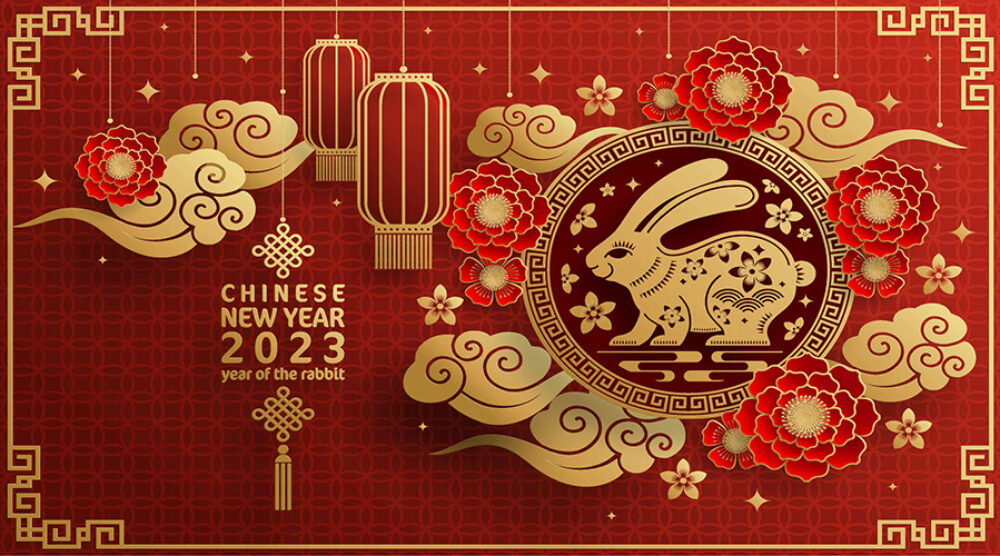On 22 January 2023, we celebrate the Chinese New Year, moving from the Year of the Tiger to the Year of the Rabbit.
Just forgetting about the Chinese zodiac for a moment, it’s difficult to think of two more different mammalian animals than the tiger and the rabbit. One is frightening and fierce. Of course, the tiger is also beautiful and courageous, but it’s best to observe its beauty from a place well separated from where the animal is, with strong and reliable protective bars if it’s close. The rabbit, on the other hand, is tame and mild, anything but fierce. It might be nervous, but it is hardly frightening. It’s more likely to be frightened of people than they are of it. Rabbits are mild, clever, quick, and productive.
In the Chinese way of looking at things, a person born in a Year of the Tiger is courageous and determined, while somebody born in a rabbit year is friendly, amiable, clever, or quick-witted, elegant, compassionate and keen to avoid conflict. Somebody born in a Year of the Rabbit might encounter misfortune in another rabbit year. It’s said this can be avoided through wearing red clothes, especially those given by a friend or lover.
Among many people born in a Year of the Rabbit, let’s look at three, a Chinese and two non-Chinese.
A really distinguished “rabbit” Chinese was Emperor Qianlong. (He was actually Manchu, but Manchus count as a minority nationality of China.) He lived from 1711 to 1799 but reigned from 1735 to 1796. He was among the great Chinese emperors, and among the longest reigning. He wasn’t especially peaceful, and the last years of his reign were not among the best ones. As obvious from the dates given above, he did not die in office, but abdicated. The reason he gave for abdicating was that he did not wish to exceed his grandfather Kangxi in the length of his reign. Actually, he maintained power until his death. His abdication won him praise for his filial piety, but China was in a much worse position at the end of his reign than the beginning. It was far more corrupt and far less prosperous than when he was born, and China was not in a good position to confront the rising power of the industrializing and imperialist West, especially Britain.
Another very different “rabbit” was the great scientist Albert Einstein (1879-1955), noted for his theory of relativity. His attitude to death put him among the good “rabbits” of the world. When a blood vessel burst near his heart, he refused surgery saying he’d done his share for the world. “It’s time to go”, he said, “I will do it elegantly”. As you’ll recall, elegance is a feature of a “rabbit”.
A very different personality was Pope Benedict XVI (1927-2022). German Joseph Ratzinger was famous for his conservative thinking even before he became pope. Yes, he was conservative theologically but did do something very unusual, which was that he abdicated, something no pope had done since Gregory XII in 1415. That puts him with the Chinese “rabbit” Qianlong. As far as I know, abdication isn’t a particularly “rabbit” behaviour for monarchical figures, but it could show power was not their top priority, a “rabbit” feature.
We can view these “Years of the Rabbit” through the lens of individual people, but what about as years.
Last year wasn’t particularly calm or peaceful, and that’s what you’d expect from a “tiger year”. On the contrary, it saw a war break out in Europe, the worst for a long time. We all thought the cold war was over, but now it looks to be back with a vengeance. Tensions are mounting not just in Europe but between China and the West, especially the United States. Natural disasters are frequent.
According to Chinese astrology, 2023 should be much calmer, because a rabbit year must be more peaceful than a tiger year. Courage or ferocity gives way to amiability and reluctance to argue or fight. So maybe things will settle down, be more prosperous, with devastations from COVID tapering off. I have to admit that for me, just at the moment, it doesn’t look like that, but after all we need to give the rabbit year a bit of time.
The last “Year of the Rabbit” was 2011, Chinese New Year being on 3 February that year. It wasn’t a particularly good year. One important series of events that looked promising was the Arab Spring, which, in January, began with a successful and quick attempt to overthrow the dictatorship in Tunisia. Though, at this time in 2011, it was still the Year of the Tiger for China. By the time of the Year of the Rabbit, the Arab Spring spread to Egypt, Libya, Yemen and Syria. Apart from Syria’s, dictatorial governments were overthrown, but the replacements were no better than the originals. Yemen remains in a state of extreme poverty and instability to this day, one of the most unfortunate countries in the world.
In May 2011 the Americans succeeded in killing the culprit of the September 11, 2001 incident, Osama bin Laden, a good thing no doubt but not especially peaceful. May 2011 also saw the terrible tsunami in Fukushima, northeast Japan, which killed over 15,000 people and caused the meltdown of several nuclear reactors. All I’m saying is that the last Year of the Rabbit doesn’t give that much reason for believing that hope and peace will characterize 2023. But the thing about hope is that few can rid themselves of it, and nobody wants to. I, for one, am not frightfully optimistic about 2023, even though I’m a “rabbit” myself. But I certainly continue to hope it will be a more peaceful year than 2022.
Colin Mackerras AO FAHA is Professor Emeritus at the Department of Business Strategy and Innovation and the Griffith Asia Institute.








